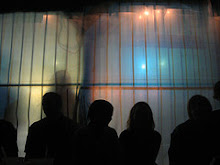3.10.2008
What are you doing?
It seems that the question always comes up. At times it even carries the weight of, "what the fuck are you doing with your life?" Like at family events and preschool reunions. So I ask,"What are you doing?" Where is your attention right now, in that general life path way, or in the moment to moment of not really knowing?
Subscribe to:
Post Comments (Atom)

4 comments:
I'm in a new place, trying really hard to figure out what I'm doing, only to find out that I already know. I guess your energy has to get split so many different ways in order to keep up with the variety of interests that present so many opportunities in our lives. So right now, I am devoting my energy to design, music and climbing. Design serves the function of paying the bills, but it also has alot of reward and encouragement within itself, so it is much more than a job. Music is my main love, and I realize how necessarily I have to practice and play, as a duty to my soul. Then I have other peripheral interests like climbing and photography that are key and indespensible in my life.
Ultimately I am still very much trying to figure out what the hell I'm doing. The landscape design gig is cool, and I imagine that I will continue to participate in that field, and aim to be expert. I also have fantasies about being able to live off of playing music, so I keep that in vision.
What am I doing…
This question, while asking about the present, conjures up thoughts of the future as well. The future actually kinda fascinates and intrigues me. If you told me that I was gonna be an engineer in Angola, Africa 3 years ago, 2 years ago even, I would certainly have laughed in your face. I am willing to bet yall would have too. Actually, I still kinda laugh when I tell people that I work in Africa. I have absolutely no expectations for what the future ‘should’ hold, no master plan, no short term plan, no nothing. And I think I like it like that right now. However, I definitely feel as if I’m kinda stumbling through life.
With that being said, I’m sure all will work out in due time. I know I like traveling, so I will do that as much as possible while I can. I know I like to see live music, so I’ll keep doing that as well. I am thoroughly enjoying being 20something, so I’ll keep goin with that for as long as I can get away with it.
To answer your question, let me refer to one of my facebook quotes. Ken Kesey once wrote:
What's really interesting [in life] is the mystery. If you seek the mystery instead of the answer, you'll always be seeking. I've never seen anybody really find the answer-- they think they have, so they stop thinking. But the job is to seek mystery, evoke mystery, plant a garden in which strange plants grow and mysteries bloom.
Stumbling through life has a sorta negative connotation, so please allow me to rephrase: I am seeking the mystery of life.
Right now, at this very second, I am taking a break from my research on discourse analysis. Last week I learned that the American Speech-Language and Hearing Association (ASHA) accepted my case proposal and I will be presenting at next year’s national convention. I named this project “Windows into the mind: the use of poetry in aphasia group therapy.”
I am totally fascinated by the brain. This semester I have the opportunity to work with a lady who survived a left hemisphere stroke. The insult occurred in Broca’s area, part of the frontal lobe, and caused an expressive aphasia. When the resulting deficits of a brain lesion affect speech or language, they are called aphasias.
My client’s speech is poorly articulated and produced with considerable effort. In therapy we work on functional skills required for daily living as well as social and pragmatic skills. Essentially, we work on creating new brain pathways to help her facilitate speech and language and reach her targets.
It is important to understand that this individual’s receptive language abilities are not severely impaired. She is extremely intelligent. During part of the session we read Bible passages and make notes together to prepare for her Bible study meetings. I also use the data from this activity to assess her reading comprehension and retention skills. I help her organize her thoughts and reflections in advance so that she feels confident enough to contribute during group discussions.
The second portion of our therapy sessions is dedicated to group activities. This is where the poetry comes in. Research has shown that doing sudoku and crossword puzzles increases brain activity because it requires higher level thinking. The same is true for poetry analysis.
Our aphasia therapy group consists of four clients and four clinicians. Some clients have receptive aphasias; one has impairments resulting from a traumatic brain injury. Each client’s disorder and degree severity is different but the cohesion of the group is remarkable. They actually help each other facilitate speech and language. The use of poetry in this setting was a wild idea that I dreamed up with my clinic supervisor one afternoon. We took the leap and the response was tremendous.
On the first day the clients began interpreting, analyzing, and relating to the poems with the help of their clinicians. They shared personal stories, childhood memories and even cracked jokes! These behaviors and interactions are typically few and far between for individuals with these disorders. The positive results are undeniable. Now, my mission is to demonstrate that these practices are evidence based by providing conclusive research to illustrate the methods behind this magic.
Post a Comment